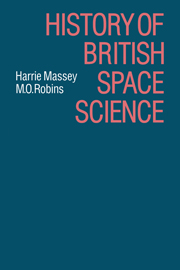Book contents
- Frontmatter
- Contents
- Glossary of abbreviations in text and annexes
- Glossary of abbreviations in appendices
- Preface
- 1 The scientific background
- 2 The technical background
- 3 The initiation of the Skylark rocket programme – the IGY and artificial satellites
- 4 Post-IGY developments – NASA – COSPAR – British National Committee for Space Research – British satellite experiments
- 5 The Ariel programme
- 6 The European Space Research Organization
- 7 Commonwealth co-operation in space reseach
- 8 Smaller rockets for scientific purposes – Skua and Petrel
- 9 Attitude controlled Skylark rockets
- 10 The Trend Committee and the Science Research Council
- 11 The transformation of ESRO into ESA
- 12 The Space Science Committee for Europe
- 13 Scientific studies by British space scientists – figure of the earth and the neutral atmosphere
- 14 Scientific studies by British space scientists – the ionosphere, the magnetosphere and cosmic rays
- 15 The contribution from British space scientists to astronomy
- 16 Concluding remarks
- Appendices
- Annexes
- Notes
- Index
7 - Commonwealth co-operation in space reseach
Published online by Cambridge University Press: 05 February 2012
- Frontmatter
- Contents
- Glossary of abbreviations in text and annexes
- Glossary of abbreviations in appendices
- Preface
- 1 The scientific background
- 2 The technical background
- 3 The initiation of the Skylark rocket programme – the IGY and artificial satellites
- 4 Post-IGY developments – NASA – COSPAR – British National Committee for Space Research – British satellite experiments
- 5 The Ariel programme
- 6 The European Space Research Organization
- 7 Commonwealth co-operation in space reseach
- 8 Smaller rockets for scientific purposes – Skua and Petrel
- 9 Attitude controlled Skylark rockets
- 10 The Trend Committee and the Science Research Council
- 11 The transformation of ESRO into ESA
- 12 The Space Science Committee for Europe
- 13 Scientific studies by British space scientists – figure of the earth and the neutral atmosphere
- 14 Scientific studies by British space scientists – the ionosphere, the magnetosphere and cosmic rays
- 15 The contribution from British space scientists to astronomy
- 16 Concluding remarks
- Appendices
- Annexes
- Notes
- Index
Summary
Reference has already been made in Chapter 4 to the statement made by the Prime Minister to the House of Commons on 12 May 1959 about space research in Britain. In this he referred, among the different possibilities for the provision of satellite launching systems, to that involving co-operation with some Commonwealth countries. Following this statement, enquiries were made through the UK High Commission in various Commonwealth countries about possibilities of collaboration, not only as regards launching systems but in other aspects of space research such as tracking, data analysis, provision of launching sites for rockets and satellites, and the preparation of scientific experiments to operate in space. Canada, Australia, New Zealand and India expressed interest in different aspects of the matter. Thus Canada, while favourable to collaboration in general, drew attention especially to the existence of their topside ionospheric sounder programme that offered many opportunities for UK participation. Australia was interested in the use of Woomera for launching satellites and a proposal for a space experiment concerning cosmic rays was made by H.G. Messel of Sydney University. India welcomed co-operation in the first instance in tracking and the preparation of scientific equipment. New Zealand welcomed the suggestions for collaboration and looked forward to receiving further details. No country indicated any interest in participation in the development of a satellite launching system as such.
- Type
- Chapter
- Information
- History of British Space Science , pp. 163 - 176Publisher: Cambridge University PressPrint publication year: 1986



